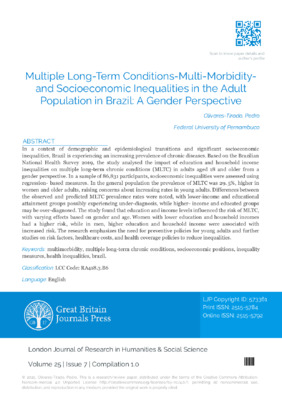Multiple Long-Term Conditions-Multi-Morbidity and Socioeconomic Inequalities in the Adult Population in Brazil: A Gender Perspective
Keywords:
brazil, multimorbidity, multiple long-term chronic conditions, socioeconomic positions, inequality measures, health inequalitiesAbstract
In a context of a demographic and epidemiological transitions and significant socioeconomic inequalities, Brazil is experiencing an increasing prevalence of chronic diseases. Based on the Brazilian National Health Survey 2019, the study analysed the impact of education and household income inequalities on multiple long-term chronic conditions (MLTC) in adults aged 18 and older from a gender perspective.�In a sample of 86,831 participants, socioeconomic inequalities were assessed using regression-based measures. In the general population the prevalence of MLTC was 29.�5%, higher in women and older adults, raising concerns about increasing rates in young adults.�Differences between the observed and predicted MLTC prevalence rates were noted, with lower-income and educational attainment groups possibly experiencing under-diagnosis, while higher-income and educated groups may be over-diagnosed. The study found that education and income levels influenced the risk of MLTC, with varying effects based on gender and age.�Women with lower education and household incomes had a higher risk, while in men, higher education and household income were associated with increased risk.�The research emphasizes the need for preventive policies for young adults and further studies on risk factors, healthcare costs, and health coverage policies to reduce inequalities.
References

Downloads
Published
Issue
Section
License
Copyright (c) 2025 Authors and Global Journals Private Limited

This work is licensed under a Creative Commons Attribution 4.0 International License.





